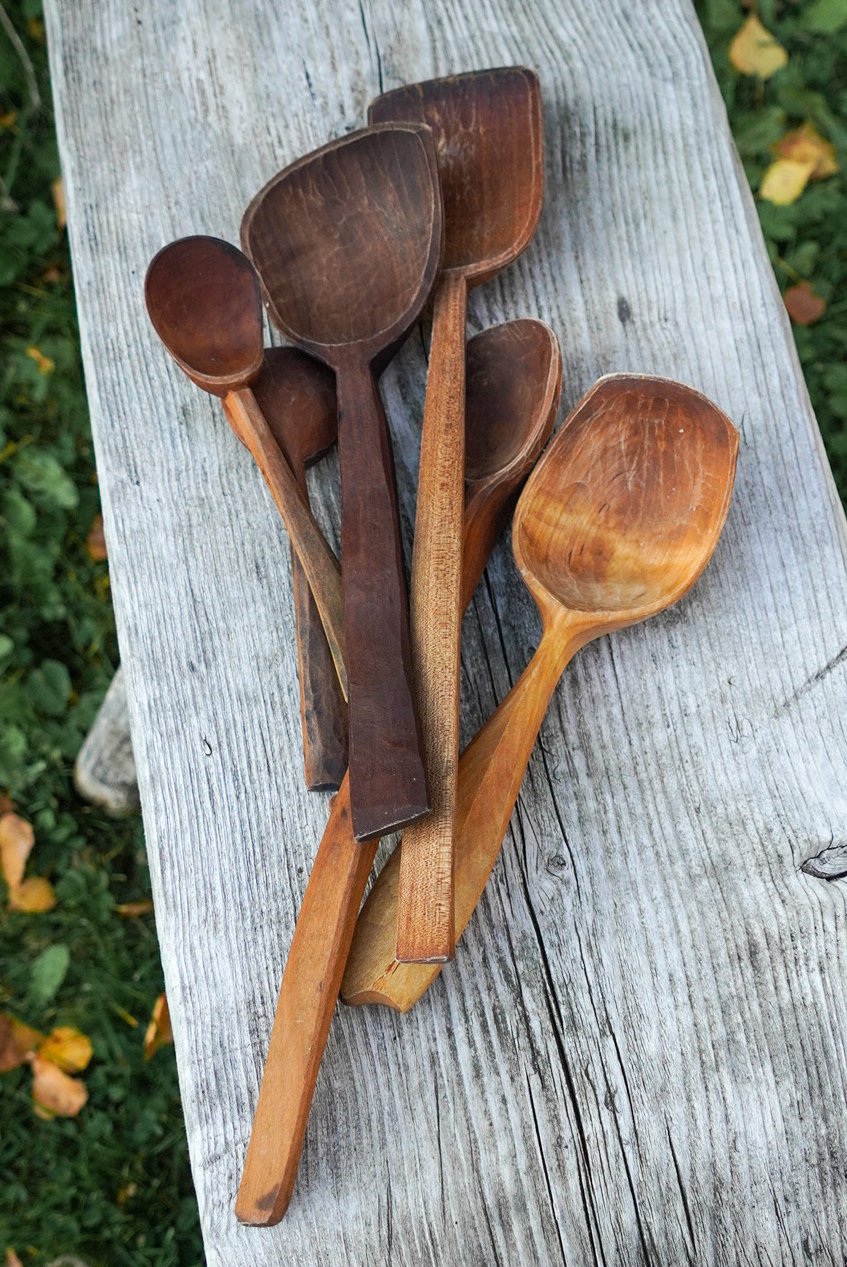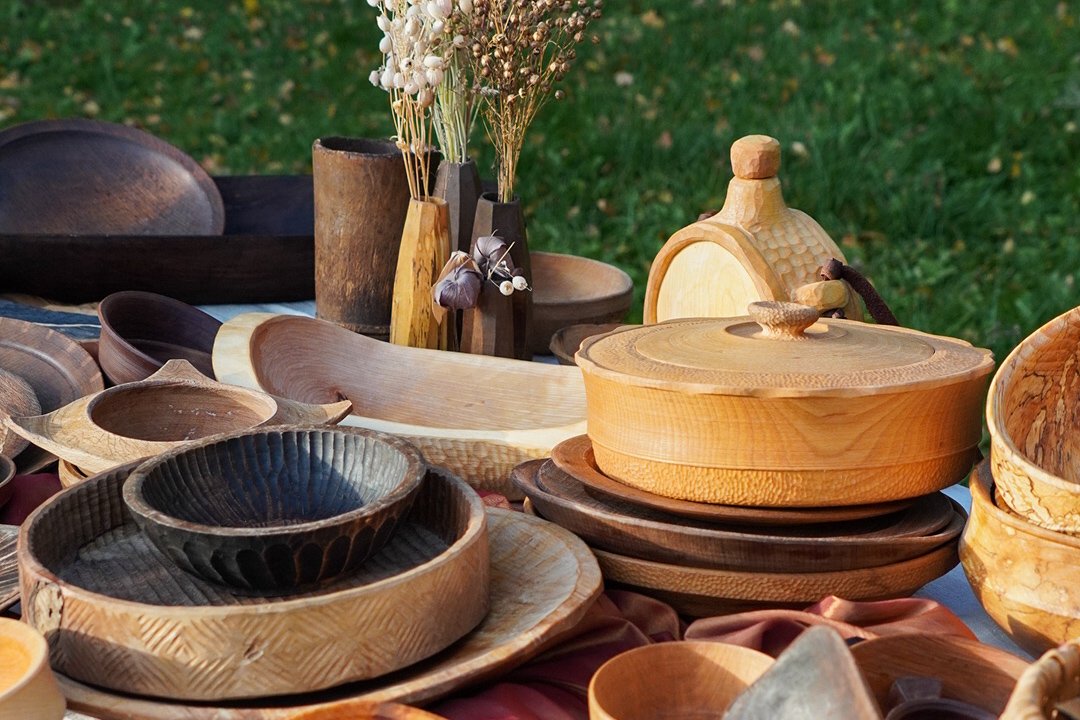How to Care for Wooden Wares: Debunking Myths and Providing Practical Tips
In recent years, wooden kitchenware like utensils, cutting boards, and bowls have made a strong comeback in kitchens everywhere. Many people are drawn to the natural beauty and warmth they bring to everyday cooking and dining. However, common concerns often arise about the safety and care of these timeless tools. Are they hygienic? How do you maintain them? The purpose of this blog is to provide accurate information and help you feel confident about using wooden wares in your daily life, whether you’re a newcomer or a current customer of Wild Crafted Home.
Common Myths About Wooden Wares
• Myth 1: Wood is unsanitary compared to plastic or metal.
Reality: Wood has natural antibacterial properties that often make it a safer option for food safety. Studies have shown that certain types of wood can inhibit bacterial growth, and when properly cleaned, wooden wares can be just as sanitary, if not more so, than their plastic counterparts.
(Reference studies that discuss the antibacterial properties of wood.)
• Myth 2: Wood is difficult to care for and will warp or crack easily.
Reality: With the right care, wooden wares are quite durable and long-lasting. In our experience, many of our bowls and spoons have held up beautifully despite occasional misuse. Following simple care guidelines ensures longevity.
• Myth 3: Wooden wares can’t handle wet foods or need constant conditioning.
Reality: Wooden pieces can certainly handle soups, salads, and other wet foods when dried properly after use. Our wooden wares are finished with carefully studied food-safe finishes, which helps prevent absorption of moisture and odors. Contrary to popular belief, we don’t recommend regular conditioning; our wares are ready to use right away.
2. Benefits of Using Wooden Wares
• Sustainability: Our wooden wares are primarily made from storm-fallen wood, trimmed wood, and trees that were casualties of the timber and paper industry. When we harvest trees, we utilize land-tending practices that promote biodiversity. By choosing wooden wares, you’re opting for eco-friendly and sustainable materials that leaves a minimal environmental footprint.
• Durability: With proper care and regular use, wooden wares can last a lifetime, gracefully adapting with the seasons of your kitchen. We use carefully studied food-safe finishes that protect the wood while allowing it to breathe and move naturally.
• Aesthetics and Feel: Wooden wares add warmth and texture to your kitchen. There’s something special about using handcrafted pieces that connect you to the craft and the materials, making every meal feel more intentional.
• Versatility: Our bowls and spoons are designed for everything—cooking, serving, eating, and enjoying. We believe in the versatility of wooden wares, which make them a staple in any kitchen.
3. Proper Care for Wooden Wares
Caring for your wooden wares is essential to ensure they remain beautiful and functional for years to come. Here are some practical tips to help you maintain your wooden bowls, spoons, and utensils, whether they’re from Wild Crafted Home or another skilled artisan:
Cleaning Tips for Wooden Kitchenwares:
Caring for the wooden pieces in your home can be quite simple. Often simpler is better. Keep your wooden wares in top shape with these straightforward cleaning guidelines:
Do:
Hand wash your wooden utensils and vessels with warm to hot water (but not scalding), using a dishcloth or a natural fiber dish brush (a plastic dish brush is fine too).
If necessary, you can soak them for less than 20 minutes to loosen stuck food, but be mindful that prolonged soaking can lead to discoloration and warping.
Don’t:
Avoid soaking your wooden wares for too long or putting them in the dishwasher. The harsh detergents and high heat of the dishwasher can shock the wood, causing unexpected cracks due to rapid changes in moisture and temperature.
Avoid using abrasive sponges and pads (or steel wool). These can act like very rough sand paper raising the fibers of the wooden wares and making them fuzzy and uncomfortable to use, which you don’t want. It will also make them look more dull in appearance.
Avoid harsh chemicals and detergents. Warm water and dish soap is usually enough for all their care.
Drying and Storage:
After washing, rinse your wooden wares thoroughly and let them drain on a dish rack or towel. You can also give them a towel dry if you prefer. It’s essential to avoid leaving your wooden pieces in direct sunlight or near a hot fire after they’ve been wet, as this can cause further tension in the wood grain and lead to cracks.
Handcrafted wares of any material are great for utility and decor. We love to have the pieces in our kitchen on display on a shelf when not in use. Our spoons are often standing out in jars by the stove, and eating spoons are in a jar or similar on the dining table.
A Note on Usage:
One of the beautiful aspects of wooden wares is that they are alive and continue to breathe with the seasons. We use our wooden pieces for everything—from soups and salads to porridge and coffee—because they can handle wet foods as long as you’re aware of how long they’re wet. Over time, the oils from your hands and food naturally condition the wood, enhancing the durability of your wooden kitchen utensils. Regular use can enhance the longevity of your wooden wares, much like cast iron cookware, which thrives with care and use.
If you feel that your wares are getting dull and dry then you can condition them with a natural oil (In our home since we use the wares so regularly we almost never give them a new coat of oil!)
We choose oils that polymerize (walnut oil, tung oil, linseed oil), which means that they harden and create a protective barrier. The drying and curing times of each oil varies but most take weeks to months to fully cure. If you use oils that don’t polymerize then the risk is that the oil either goes rancid with air exposure or that the oil comes out when the piece is used with hot foods and liquids.
If the piece you are using is not used with hot substances or you want a quick and simple solution and aren’t concerned about how it stays in the wood then the oil you choose is up to you. We know other wood workers who choose sunflower oil as it is very accessible, quite flavorless and odorless.
Building a Relationship:
Caring for wooden wares requires a different relationship compared to plastics, metals, and ceramics. They ask you to pause and connect with your everyday items, appreciating the craftsmanship and the unique character that each piece brings to your kitchen. By following these simple care tips, you can ensure that your wooden wares remain functional and beautiful for years to come.
5. An Ode to Patina
One of the most enchanting features of wooden wares is their ability to develop a natural patina over time. As you use your bowls, spoons, and other pieces, they may darken, develop unique markings, or change in color, each transformation telling its own story. This evolution reflects the history of the piece and the care you’ve given it, capturing moments from your kitchen and life.
Embracing the patina of wooden wares means celebrating the imperfections and changes that come with time. Unlike synthetic materials that remain static, wood breathes and evolves, gaining character and depth through daily use. Each scratch, color change, and subtle variation in grain adds to the narrative of your wares, creating a connection that is both personal and enduring.
Some may view patina as a flaw, but we believe it is a testament to the life and love your wooden pieces have experienced. It signifies the joy of meals shared, the warmth of your home, and the commitment to sustainability inherent in using wooden wares.
To maintain an even tone and showcase the beauty of your pieces, occasional reconditioning may be beneficial, though it’s typically not necessary with our carefully studied finishes. Instead of worrying about preserving a perfect appearance, embrace the natural changes that come with time. Each piece becomes a part of your family’s story, reflecting the beauty of impermanence and the joy of using handcrafted wooden wares.
In conclusion, wooden wares offer a safe, sustainable, and beautiful option for your kitchen when cared for properly. By debunking myths and sharing practical tips, we hope to empower you to embrace the uniqueness of wooden pieces in your daily life. From their natural antibacterial properties to their rich history and evolving patina, wooden wares are not just functional tools; they are companions in your culinary adventures.
Remember, using wooden wares requires a different relationship than plastics, metals, and ceramics. They invite you to pause and connect with your everyday items, creating a bond that enhances your cooking and dining experiences. Like cast iron, wooden pieces become better with use, developing character and warmth over time.
We encourage you to fully enjoy your wooden bowls, spoons, and plates, knowing that they can withstand the rigors of everyday life while adding a touch of nature to your kitchen. Explore our handcrafted wares and discover how they can enhance your cooking and dining rituals. Each piece reflects our commitment to sustainability, craftsmanship, and the beauty of natural materials.
Join us in celebrating the artistry of wooden wares, and let them become a cherished part of your home for years to come. If you have any questions or need care tips, feel free to reach out. We’re here to help you make the most of your wooden wares!



